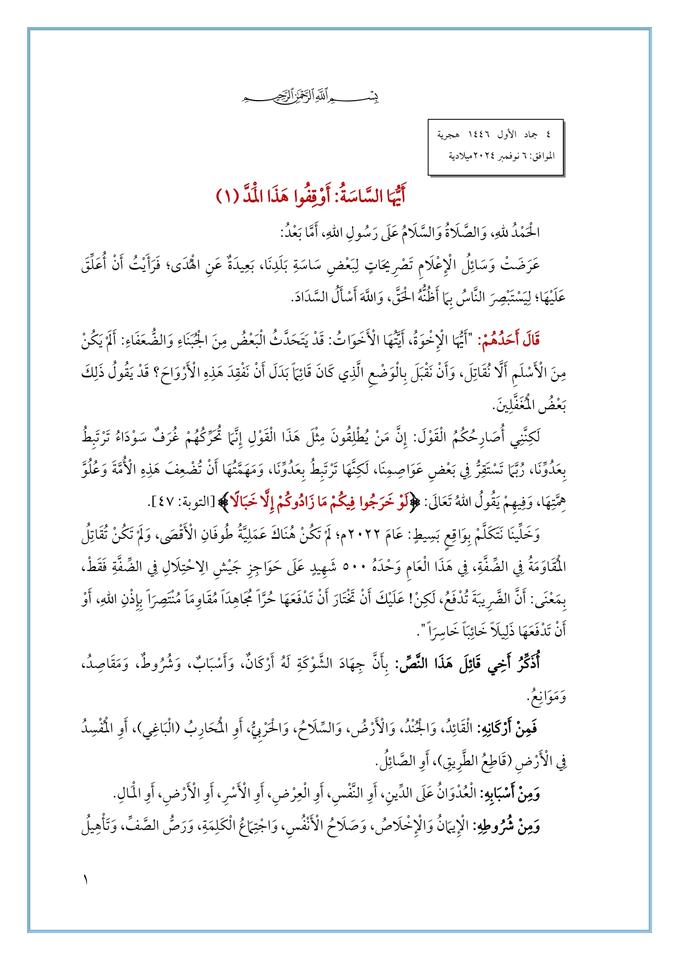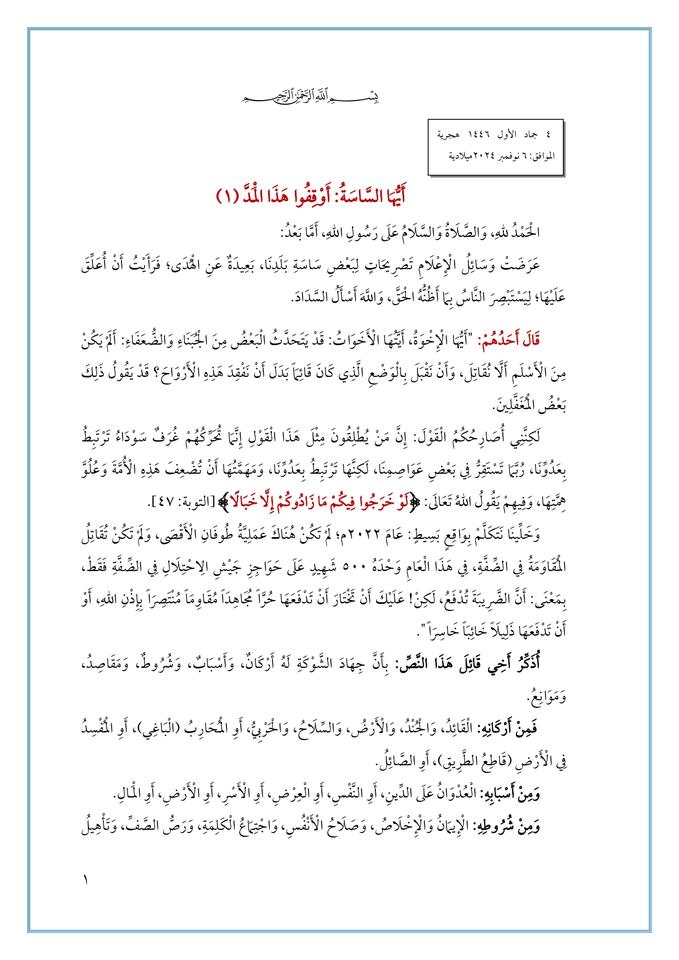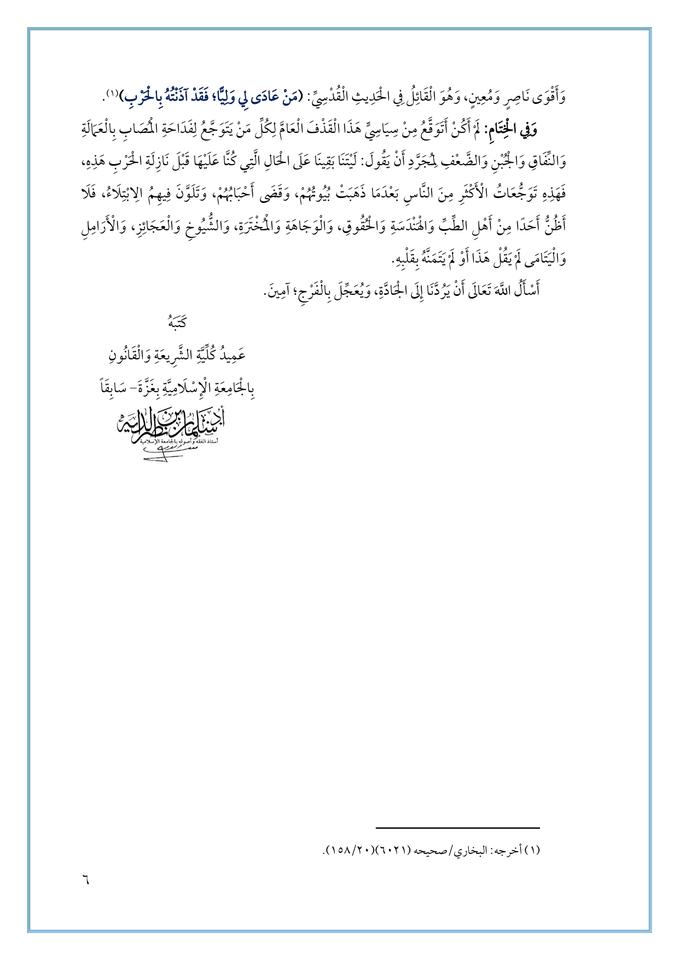Ann Arbor (Informed Comment) – Rushdi Abualouf of the BBC reported on a new fatwa or considered legal opinion issued by the conservative Salafi scholar Dr Salman al-Dayah, who had once been a dean at the School of Islamic Law and Civil Law at the Islamic University of Gaza. The controversial opinion lambasted Hamas for launching the “al-Aqsa Flood” military operation on October 7, 2023, saying that it was foreseeable that it would fail and would violate Islamic precepts on the waging of struggle (jihad) in the way of God.
Al-Dayah begins by quoting an unnamed Hamas leader who condemned critics of the organization’s attack on Israel.
The politician castigated as “fools” those who argued that it would have been safer to avoid armed conflict rather than losing tens of thousands of lives. The politician denounced such persons as a fifth column for Israel, aiming to weaken “this nation and its determination.” The Hamas leader alleged that Israel killed 500 Palestinians at West Bank checkpoints in 2022, even though the Palestinians were not engaged in violent struggle that year. He implied that Israel would kill Palestinians even if they were passive. The price for being occupied was being paid then, but, he said, “you have to choose whether to pay it freely as a fighter and a victor, God willing, or to pay it in humiliation, disappointment, and loss.”
Al-Dayah refutes this militant, reminding him that struggling in the way of God is not a straightforward, simplistic duty, but is predicated on conditions, purposes and principles. It is necessary to consider matters such as the character of one’s leaders and soldiers, the terrain, the weaponry available, and the character of the opponent (whom he calls “the aggressor,” suggesting he believes this warfare is defensive).
[The issue of “terrain” is an important one. I quote Mao Zedong in my new book, Gaza Yet Stands, to the effect that having rugged terrain that affords hiding places is essential to a guerrilla movement. Otherwise, Mao said, the insurgents are just roving peasant rebels, doomed to fail. Gaza is not a promising place from which to fight a guerrilla struggle.]
Al-Dayah repeats that “aggression against religion” is one of the grounds for launching such a military struggle, as are “life, honor, family, land or property.”
Since it is a religious struggle, it has to be predicated on faith and sincerity, the righteousness of the individuals involved, and their cohesiveness and preparation, as well as logistical matters.
But there are, al-Dayah says, also counter-indications that might weigh against launching such a struggle. If the prerequisites listed above are lacking or defective, it cannot be undertaken.
Most important, you can’t launch a struggle for the faith if it seems likely that it will fail: “it is essential to avoid it if it is likely to bring harm to religion, life, honor, family, or property.”
He points out that the Qur’an, the Muslim scripture, promises that pious Muslims can prevail when the odds are 1 to 2 (Q. 8:66). The conclusion we may draw from the verse is that the believers cannot win against just any odds. If they are overwhelmed 3 to 1, they should avoid entering the fray. He quotes the Prophet Muhammad’s cousin, Ibn Abbas, as having said: “If a man retreats from two, he has fled, but if he retreats from three, he has not fled.”
His implication is that the Israeli armed forces are far superior in numbers, training, and equipment to the 30,000 members of the al-Qassam Brigades, the paramilitary of Hamas. Given this reality, it is “permissible to refrain from initiating combat.”
He also repudiated the Hamas leader for his harsh accusations against suffering Palestinians mourning the gravity of the disaster that has befallen them. They don’t, he insisted, deserve to be called agents or cowards for wishing it could have been avoided.
He points out, “These are the sentiments of the majority of people, whose homes are gone, their loved ones have perished, and they endure all forms of suffering.”
He concludes, “I ask God Almighty to return us to the right path and hasten relief. Amen.”
Prof. Dr. Salman bin Nasr Al-Dayah
The legal opinion has six sections, with this having been the first. In subsequent broadsides, he went on to elaborate his arguments. For instance, he quotes a saying of the Prophet that “it is not for the believer to humiliate himself” by undertaking a campaign clearly doomed to failure. I think, however, we get the point.
Al-Dayah rejects secular states and even the fundamentalist governance of Hamas, arguing for a restored Muslim caliphate or theocracy. However, he belongs to the quietist branch of Salafism or revivalism, since he generally rejects violence as a path to his aspirations, especially if the violence is stupid. Al-Dayah has refused to leave North Gaza, even though the Israeli authorities are attempting to ethnically cleanse it.
Similar debates were conducted between quietist Salafis in Jordan and the proponents of ISIL (ISIS, Daesh), the so-called “Islamic state” group.
Before the 2006 election, nearly half of the voters in Gaza supported the secular, nationalist Palestine Liberation Organization, and it is not clear that 18 years of Hamas rule will have altered this proportion. Indeed, the evidence from countries that have a state religion is that it tends to drive people away from religion or make them apathetic toward it. Al-Dayah as a quietist Salafi may not represent a very large proportion of Palestinians in Gaza. His discontents with Hamas, however, are likely widely shared.
The Arabic text of the fatwa was posted to Facebook.





 © 2025 All Rights Reserved
© 2025 All Rights Reserved